I combined the answer above with certbot SSL cert and CORS access-control-allow-headers and got it working so I thought I would share the results.
Apache httpd.conf added to the bottom of the file:
LoadModule proxy_module modules/mod_proxy.so
LoadModule proxy_http_module modules/mod_proxy_http.so
Apache VirtualHost settings (doc root for PHP is under Apache and SSL with Certbot, while node.js/socket.io site runs on port 3000 - and uses SSL cert from Apache)
Also notice the node.js site uses the proxy for the folder /nodejs, socket.io, and ws (websockets):
<IfModule mod_ssl.c>
<VirtualHost *:443>
ServerName www.example.com
ServerAlias www.example.com
DocumentRoot /var/html/www.example.com
ErrorLog /var/html/log/error.log
CustomLog /var/html/log/requests.log combined
SSLCertificateFile /etc/letsencrypt/live/www.example.com/fullchain.pem
SSLCertificateKeyFile /etc/letsencrypt/live/www.example.com/privkey.pem
Include /etc/letsencrypt/options-ssl-apache.conf
RewriteEngine On
RewriteCond %{REQUEST_URI} ^socket.io [NC]
RewriteCond %{QUERY_STRING} transport=websocket [NC]
RewriteRule /{.*} ws://localhost:3000/$1 [P,L]
RewriteCond %{HTTP:Connection} Upgrade [NC]
RewriteRule /(.*) ws://localhost:3000/$1 [P,L]
ProxyPass /nodejs http://localhost:3000/
ProxyPassReverse /nodejs http://localhost:3000/
ProxyPass /socket.io http://localhost:3000/socket.io
ProxyPassReverse /socket.io http://localhost:3000/socket.io
ProxyPass /socket.io ws://localhost:3000/socket.io
ProxyPassReverse /socket.io ws://localhost:3000/socket.io
</VirtualHost>
</IfModule>
Then my node.js app (app.js):
var express = require('express');
var app = express();
app.use(function(req, res, next) {
res.header("Access-Control-Allow-Origin", "*");
res.header("Access-Control-Allow-Headers", "X-Requested-With");
res.header("Access-Control-Allow-Headers", "Content-Type");
res.header("Access-Control-Allow-Methods", "PUT, GET, POST, DELETE, OPTIONS");
next();
});
var http = require('http').Server(app);
var io = require('socket.io')(http);
http.listen({host:'0.0.0.0',port:3000});
I force a ip4 listener, but that is optional - you can substitute:
http.listen(3000);
node.js app (app.js) code continues with:
io.of('/nodejs').on('connection', function(socket) {
//optional settings:
io.set('heartbeat timeout', 3000);
io.set('heartbeat interval', 1000);
//listener for when a user is added
socket.on('add user', function(data) {
socket.join('AnyRoomName');
socket.broadcast.emit('user joined', data);
});
//listener for when a user leaves
socket.on('remove user', function(data) {
socket.leave('AnyRoomName');
socket.broadcast.emit('user left', data);
});
//sample listener for any other function
socket.on('named-event', function(data) {
//code....
socket.broadcast.emit('named-event-broadcast', data);
});
// add more listeners as needed... use different named-events...
});
finally, on the client side (created as nodejs.js):
//notice the /nodejs path
var socket = io.connect('https://www.example.com/nodejs');
//listener for user joined
socket.on('user joined', function(data) {
// code... data shows who joined...
});
//listener for user left
socket.on('user left', function(data) {
// code... data shows who left...
});
// sample listener for any function:
socket.on('named-event-broadcast', function(data) {
// this receives the broadcast data (I use json then parse and execute code)
console.log('data1=' + data.data1);
console.log('data2=' + data.data2);
});
// sample send broadcast json data for user joined:
socket.emit('user joined', {
'userid': 'userid-value',
'username':'username-value'
});
// sample send broadcast json data for user left
//(I added the following with an event listener for 'beforeunload'):
// socket.emit('user joined', {
// 'userid': 'userid-value',
// 'username':'username-value'
// });
// sample send broadcast json data for any named-event:
socket.emit('named-event', {
'data1': 'value1',
'data2':'value2'
});
In this example when the JS loads, it will emit to the socket a "named-event" sending the data in JSON to the node.js/socket.io server.
Using the io and socket on the server under path /nodejs (connected by client), receives the data an then resends it as a broadcast. Any other users in the socket would receive the data with their listener "named-event-broadcast". Note that the sender does not receive their own broadcast.
